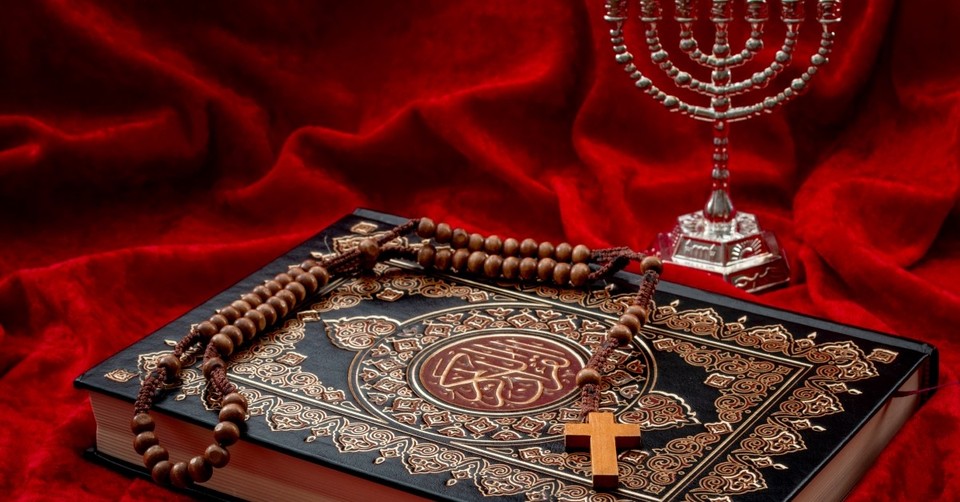What Defines the Abrahamic Religions?

Across the globe, numerous religions trace the origin of their faith to the same man. Judaism, Christianity, Islam, and several smaller religions all find their roots and history in the line of the great patriarch Abraham. Today, these groups make up what is known as the Abrahamic religions.
While these religions share several commonalities, they are separated by some opposing beliefs. In Judaism, Abraham is honored as the first Jew, the ancestor of the Israelites. He is the grandfather of Jacob, who was renamed Israel and fathered twelve sons, or the twelve tribes, of Israel.
In Christianity, Abraham is the father of faith for his obedience to God. He is the spiritual father of all who receive salvation by faith in Jesus.
In Islam, Abraham (called Ibrahim) is a prophet. He is the second most mentioned name in the Quran, and Muslims revere him as a primal Muslim. While each religion holds Abraham in honor for differing reasons, they claim several similar traditions established in their shared patriarch.
How Many Abrahamic Religions Are There?
As mentioned, Judaism, Christianity, and Islam are the most well-known Abrahamic religions, but many other groups share similar roots.
Among these religions are the Baha’i faith, Babism, Druze, and Samaritan. The Baha’i faith, Babism, and Druze originated from Islamic beliefs but consider their religions independent of Islam. Samaritan roots are based in Israel, but they identify as a separate religion from Judaism due to several opposing ideas. Many sources also include Rastafari, Yezedi, and Mandaism as Abrahamic religions. However, Abrahamicstudyhall.org and other resources note that various opinions debate how closely these religions adhere to the core Abrahamic tradition. To understand the major distinctions between these faith groups, we will only take a deeper look into Judaism, Christianity, and Islam.
What Common Ideas Do All the Abrahamic Religions Contain?
Considered monotheistic, the Abrahamic religions worship one god and hold firm that he is the creator of the universe. Some may argue that Christianity’s trinitarian doctrine is an exception, but the Bible makes clear that God is three in one. Abrahamic groups agree that Adam was the first man and that humans were created in the image of God. Additionally, they adhere to a doctrine of a coming Messiah but differ on who and what that looks like. They also emphasize a holy land as holding special traditions in history and future significance. Jerusalem is considered the holiest city in the world by both Jews and Christians, and Muslims consider it the third holiest city—making it a center for spiritual conflict. Followers of Abrahamic religions agree that Abraham had two sons, Isaac and Ishmael, and that God asked him to sacrifice one of his sons. Still, the controversy lies in which was the appointed son to sacrifice.
Similarly, they perceive that God revealed or manifested his will to them by a specific individual but diverge about who the chosen person was. Abraham’s physical descendents (Jews and Muslims) hold to the practice of circumcision, and Christians, or the spiritual descendants of Abraham, understand circumcision as a foreshadowing of the Holy Spirit’s work within their hearts. As “The Three Abrahamic Religions – An Intro” video notes, central themes such as judgment day, a holy book, hell and paradise, commandments, and fasting are core beliefs held by each group and integral to religious teachings. However, many opposing ideas surround these themes, causing great contention and controversy amongst the faith groups.
What Basic Ideas Separate the Abrahamic Religions?
Many fundamental beliefs separate the Abrahamic religions. Muslims worship Allah and esteem Muhammad as a prophet and divine messenger. They believe Jesus was a prophet but deny his divinity and deem him less important than Muhammad. Christianity.com contributor Vivian Bricker notes that Muslims also follow the sacred writings of the Quran, which they believe to be Allah’s direct words given to Muhammad. While Jews and Christians worship the same God, called Yahweh in Hebrew, Jews reject the belief that Jesus was the son of God, the promised Messiah. Similarly, the Jewish holy book is the Tanakh, which Christians consider the Old Testament. However, for Christians, God’s Holy Word, the Bible, consists of both the Old and New Testaments.
In the Torah (or the first five books within the Tanakh), God called Abraham to sacrifice his promised son, Isaac, on Mt. Moriah. Abraham obeyed in faith, and God intervened and provided a ram for the sacrifice. In Judaism, it is clear that the appointed son was Isaac. Christianity agrees with this and even takes it further by saying that the ram foreshadows Jesus—the sacrificial Lamb and son of God who laid down his life for the world’s sins. In Islam, however, Ishmael is believed to be the son sacrificed, and the Quran describes Allah as intervening in this test of faith.
Additionally, Muslims regard Mecca as the holiest city. Anna Sapir Abulafia explains in an article for The British Library on “The Abrahamic religions” that Muslims believe Abraham and Ishmael built the Kaaba —the center of Islam’s holiest mosque, the pinnacle of their Hajj pilgrimage. Jews regard Jerusalem as the holiest city, and many make pilgrimage there as an act of obedience to God. Similarly, Christians honor Israel as the holy land God promised to his people and look forward to their eternal hope of the New Jerusalem.
However, the most significant opposing belief lies in the means of salvation. In Islam, salvation is believed to come from repentance to Allah, yet even afterward, there remains an unsure hope that he will actually forgive. The only way a Muslim receives assurance of salvation is to die in the holy war known as jihad. In Judaism, salvation is believed to be collective or national and looks like God’s favor on the nation of Israel. Jews deny a personal need for salvation, and while they do believe that their disobedience to God has consequences on earth, they do not see their need for eternal salvation. They recognize the need for atonement, as revealed in the remembrance of Yom Kippur, but deny that Jesus was the sacrificial lamb that covers them. As Chosenpeople.com contributor David Sedacca explains, repentance, prayer, and good deeds (or merits of the Patriarchs) are the hope of forgiveness and national salvation in Judaism.
For the Christian, salvation is a free gift received by faith in Jesus for the forgiveness of sins—not by works. The one who repents and believes that Jesus is the Son of God, the world’s Savior, finds assurance of eternal salvation. Romans 10:9 says, “If you confess with your mouth that Jesus is Lord, and believe in your heart that God raised Him from the dead, you will be saved.” (ESV)
Why Is Abraham Such a Central Figure in Multiple Religions?
God chose Abraham out of all the people on the earth and made a covenant with him. The covenant consisted of a nation, a promised land, and descendants beyond number. In Genesis, God tells Abraham, “I will establish my covenant between me and you and your offspring after you throughout their generations for an everlasting covenant, to be God to you and to your offspring after you (Genesis 17:7 ESV).”
Although God promised him many descendents, Abraham’s wife Sarah remained barren. During the long waiting period, Abraham and Sarah’s unbelief resulted in Ishmael, Abraham’s first son, being born of their servant Hagar. However, God’s covenant remained, and the promised son was not replaced or forgotten. Around thirteen years later, Sarah conceived and gave birth to Abraham’s second son—the promised son, Isaac. Islam ties their family line to Ishmael today, while Judaism and Christianity trace their roots to Isaac.
God makes his plan for Abraham’s two sons. In fact, when God appeared to Abraham in Genesis 17, he not only promised the birth of Isaac but spoke of Ishmael’s destiny.
“God said, ‘No, but Sarah your wife shall bear you a son, and you shall call his name Isaac. I will establish my covenant with him as an everlasting covenant for his offspring after him. As for Ishmael, I have heard you; behold, I have blessed him and will make him fruitful and multiply him greatly. He shall father twelve princes, and I will make him into a great nation. But I will establish my covenant with Isaac, whom Sarah shall bear to you at this time next year.” (Genesis 17:19-21 ESV)
God promised to multiply Ishmael’s descendants, but Isaac was the son chosen to walk in His covenantal blessing. This resulted in bitterness and hostility between the two brothers. In fact, to this day, it is this very reason that so much conflict exists in the Middle East—because of the hostility that started thousands of years ago between the sons of Abraham. God chose Isaac’s family line to bring His Son into the world. Jesus, the Messiah, born from the tribe of Judah, came as an ultimate fulfillment of God’s promise to Abraham and the blessing upon His descendants.
Over half of the world’s population today falls under the Abrahamic faith umbrella. The multiplication of Abraham’s lineage proves God’s special relationship and covenant with him. When God makes a promise, he keeps it, which is why Abraham remains a central figure in many faith groups.
Photo Credit: © Getty Images/Moussa81
Maddy Rager is a copywriter who recently launched her own freelance business. She has always had a passion for writing and conveying the truths of God's word to compel others to know Him more deeply. She also loves to write music and released a personal EP in 2020. Maddy and her husband live in Franklin, TN and are actively involved in their church and community where they lead worship together in various contexts. You can learn more about her work at www.ragercreative.com.
Originally published September 11, 2023.





